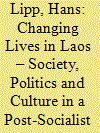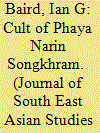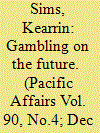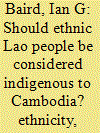|
|
|
Sort Order |
|
|
|
Items / Page
|
|
|
|
|
|
|
| Srl | Item |
| 1 |
ID:
174788


|
|
|
|
|
| Summary/Abstract |
For many people working about and being interested in Laos the two editors (Boute and Pholsena) are well known icons of scientific research about their area of expertise. Vatthana Pholsena, in particular, has in the past published a number of articles and books that are essential when doing research about Laos, which Western media sometimes like to compare with North Korea when talking about political backgrounds. All the writers of the different chapters of this book are in their way similarly outstanding even if they are not as famous as the editors.
|
|
|
|
|
|
|
|
|
|
|
|
|
|
|
|
| 2 |
ID:
131767


|
|
|
|
|
| Publication |
2014.
|
| Summary/Abstract |
Sociocultural boundaries come in many forms, and crucially, are responsive to power and constantly in flux. This article focuses on the production of space and unmarked sociocultural boundaries linked to spirit mediums in a historically contested area of northeastern Thailand who are possessed by the spirits of Phaya Narin Songkhram - a key 'Lao' military leader of Chao Anou's famous Vientiane revolt against Siam between 1826-28 - and those of his subordinates. Spirit mediums linked to ethnic 'Thai' leaders are also found to the south of this area. Through channeling and performing these historical persons, spirit mediums keep alive and reproduce group memories with space-making implications. This article also shows how the mediums' positioning has shifted over time and varies in relation to contemporary power relations, altering the sociocultural boundaries between ethnic Lao and Thai.
|
|
|
|
|
|
|
|
|
|
|
|
|
|
|
|
| 3 |
ID:
156691


|
|
|
|
|
| Summary/Abstract |
Following the extraordinary wealth generation of casinos in Macau and Singapore, governments and non-state actors across Southeast Asia have developed gambling establishments as a means of fast-tracking economic growth and stimulating national development. Yet, here and elsewhere, casinos have been heavily criticized for their association with immoral behaviour, problem gambling, corruption, and organized crime. In this article, I focus on two casinos in northern Laos to address two research questions. First, I consider how casinos have come to exist within the remote border regions of one of Asia’s least developed countries. I discuss vice economies within the Golden Triangle region, multi-actor aspirations to boost transnational connectivity within continental Southeast Asia, strengthening political-economic relationships between Laos and China, and Government of Laos efforts to use foreign investment as a mechanism for increasing governance capacities in borderlands. Following this, I critically analyze the relationship between casinos and development in Laos. I focus specifically on the multifarious effects of casinos on the lives and livelihoods of local communities to argue that casino development has been informed by logics of expulsion and the establishment of new predatory formations. To make this argument, the article draws on four fieldwork visits to each of the casino sites between 2011 and 2015, desk-based research, and interviews with local residents, casino staff, and members of the Government of Laos.
|
|
|
|
|
|
|
|
|
|
|
|
|
|
|
|
| 4 |
ID:
130578


|
|
|
|
|
| Publication |
2014.
|
| Summary/Abstract |
In the context of mineral extraction in South East Asia, the rural poor are generally portrayed as victims of large, invading corporatized mining enterprises. However, this paper argues that local villagers have also shown considerable agency in taking advantage of the mineral resource boom by diversifying their livelihoods to include informal mining. In South East Asia, the growth of informal mining has occurred within the overall process of agrarian transition. This paper focuses on a mineral-rich valley in southern Laos to highlight the location-specific nature of such transitions. The valley's environmental transformation has both caused and accompanied a modification in the peasant ways of life, and the recent entry of transnational mining companies and the growing market price of tin have fundamentally altered the relationships of the peasants with place, while at the same time encouraging them to claim mineral resource rights in ways that are not accommodated in conventional mining legislation. To conclude, the paper notes the multiple interpretations and contradictions of the increasing mineral dependence among Lao peasants in a rapidly changing world.
|
|
|
|
|
|
|
|
|
|
|
|
|
|
|
|
| 5 |
ID:
145851


|
|
|
|
|
| Summary/Abstract |
The ethnic Lao are not well-known in Cambodia, despite constituting a substantial but unrecorded population there. Even though the Lao have lived in Cambodia for many generations, they were excluded from being considered ‘indigenous peoples’ when the category was legally introduced to Cambodia through the 2001 land law. Instead, they are not classified as ‘ethnic Lao’, except for the very few who were actually born in Laos. Here, I consider how the politics of identity in Cambodia has separated some highland ethnic minorities from the Lao. Many ethnic Lao in Cambodia quietly disagree with not being classified as indigenous. This contestation represents a similar dynamic to the differences of opinion between the Asian Indigenous Peoples Pact (AIPP) and the peasant organization, La Via Campesina, regarding advocating for indigenous and peasant rights, respectively. My objective is to demonstrate that the politics of indigenous categorization in Cambodia is complicated and fraught.
|
|
|
|
|
|
|
|
|
|
|
|
|
|
|
|
|
|
|
|
|